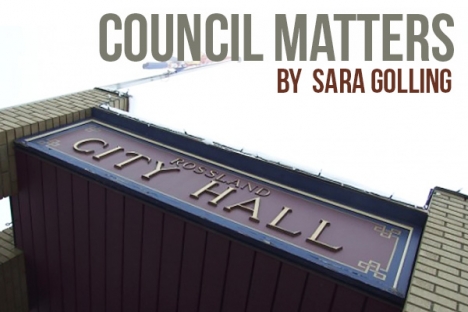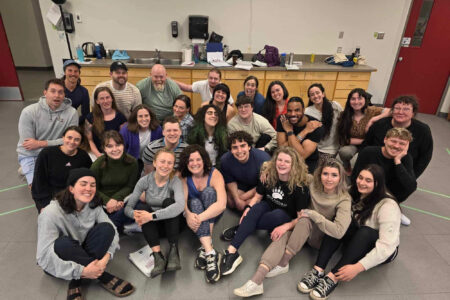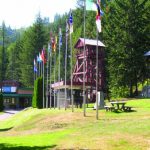Council Matters: Small but mighty! Rossland is Canada's 10th City committed to 100% renewable energy
Rossland City Council Meeting, January 21, 2019
Councillors Present: Mayor Kathy Moore, and Councillors Dirk Lewis, Janice Nightingale, Chris Bowman, Stewart Spooner, and Andy Morel. Absent: Scott Forsythe
Staff Attending: Chief Administrative Officer Bryan Teasdale, Chief Financial Officer Elma Hamming, Deputy Corporate Officer Cynthia Añonuevo, Manager of Planning Stacey Lightbourne, and Manager of Operations Darrin Albo.
Public Input Period:
Laura Petit spoke to provide a “traffic update.” She reported that the vehicles that are “really flying by on Thompson Avenue are BC Transit.” She suggested that someone should let BC Transit know that their drivers are speeding.
Sue Wrigley spoke in support of the wildlife resolution on the agenda at the end of the meeting, and told about an undernourished bear cub that she had rescued, with Moore’s assistance. It was obvious that there were no clear provincial guidelines, and much delay and confusion resulted, with the cub suffering in the meantime.
Larry Doell spoke as a member of the Rossland Heritage Commission, and presented the plaque commemorating Ross Thompson, the founder of Rossland. The large and heavy metal plaque shows a picture of Thompson, a map of the original townsite, and a picture of the house Thompson built, and includes a brief précis of Thompson’s history in Rossland. The plaque will be mounted in downtown Rossland at a suitable place yet to be determined.
Delegations:
Terry Van Horn of the Lower Columbia Initiatives Corporation updated Council about the activities and successes of the LCIC and the Lower Columbia Development Team Society (which owns the LCIC) and presented a detailed report, which can be found in the Council agenda materials for this meeting. She also reported that LCIC is “engaging the communities of Castlegar and Nelson about a larger regional economic strategy.”
Montana Burgess of the EcoSociety asked for Council’s vote to commit Rossland to being “100% Renewable” in energy use by 2050, after explaining why it’s urgently needed and listing a number of ways that can help get us there. One of the key solutions is to use less energy. She pointed out that 50% of Canada’s carbon pollution is “within the influence of municipal governments,” and introduced Matt Murray, a renewable energy planner working with the EcoSociety.
She spoke of other jurisdictions that have committed to achieving 100% renewable, some of them earlier than 2050.
Burgess presented a draft resolution: “That the community of Rossland aims to transition to 100 percent renewable energy in all energy-use sectors in the community, including heating and cooling, transportation, electricity, and waste management, no later than 2015. The Mayor and Council of the City of Rossland requests that the City of Rossland Staff collaborate with other local governments and community stakeholders in the region as well as leading experts, to develop a plan for this transition by December 1, 2020.”
Andy Morel put forward the motion. He said that it’s very important for small communities to act, because the other levels of government are not doing what is needed, but when municipalities agree to act, it influences the other levels of government. “We’re small but we’re mighty. … We should take the leadership,” he declared.
Dirk Lewis said he thinks the matter is very urgent, and Chris Bowman agreed, indicating that if our society doesn’t act, “we can’t survive.” Spooner agreed, but wanted to ensure that there is a large volunteer component, and that the resolution is “not a hollow gesture.” Moore also supported the motion and it CARRIED unanimously.
Rossland is now the 10th Canadian city to make the commitment to achieving 100% renewable energy.
Alex Loeb of Rossland’s Sustainability Commission (SC) wants everyone to know that “the SC has some exciting volunteer positions open for residents who want to help achieve these goals: http://visionstoaction.ca/news/sustainable-rossland-volunteer-us”
Policies:
Council reviewed and re-confirmed four policies: the Proclamation Policy, the Advertising and Promotions Policy, and the Employee Service Innovation Award Policy.
Nightingale moved to defer the Financial Assistance for Use of Facilities, Pools and Parks Policy until Council has more information. Spooner commented that he thinks the policy is a poor solution to the problem. The motion to defer CARRIED unanimously.
Then the Short-Term Rental Accommodations Policy came up for review – at the previous Council meeting, Councillor Scott Forsythe had requested that it be reviewed, because he thought that the wording of the policy needed to be clarified on the issue of density and the discretion of Council to refuse applications. Nightingale moved that the wording be adjusted to explain that applications are at the discretion of staff and Council, based on density. Morel asked about current compliance; Lightbourne said the non-compliant ads have been reduced greatly since the City began sending out letters to non-compliant places and imposing fines.
Council members noted that the current wording of the policy, read as a whole, does make it clear that each decision is at the discretion of Council, and lists various factors to be considered, including “the density of short-term rentals in the vicinity of the property … ”
The motion to adjust the wording of the policy FAILED unanimously.
The motion to reconfirm the policy CARRIED unanimously.
Bylaw:
Council reviewed a draft new bylaw, the Land Application Procedures Bylaw, which is designed to simplify and clarify applications for land use permits, variances, and so on, and will enable staff to prepare a guide for applicants which should help to streamline the process for both applicants and staff.
A motion to give the bylaw first, second and third readings CARRIED unanimously.
Staff Updates and Reports:
Request for closure of Washington Street from Columbia to Third Avenue for the Sonny Samuelson bobsled race, to alleviate traffic tie-ups, and Queen Street both north and south of Columbia Avenue for the Ice Palace and the Rail Jam; a motion to approve the requests CARRIED unanimously.
Local Government Management Association Tree Planting: A motion to select a tree to plant in recognition of the local government profession and its ongoing commitment to the community CARRIED unanimously.
Council reviewed the draft Terms of Reference for the Rossland Recreation Task Force. A motion to adopt the ToRs CARRIED unanimously.
Council then looked at the Building Permit Report, the 2018 Q4 Budget Update, and the Updated Task List. Moore noted that the plastic bag issue had gone from “Medium” priority to “Low” and wondered why. Morel acknowledged that it is a daunting task; Moore said there is a citizen group waiting for the City to bring forward a bylaw. Lewis commented that RSEA has discussed it. Spooner said it seemed that it wasn’t a popular idea with staff, and he asked why; Teasdale explained that drafting and passing the bylaw is one thing, but dealing with implementation and complaints is a whole other matter. Moore noted that enforcement would not need to be imposed for the first year or so, just outreach and education; that was Victoria’s approach. Morel said he thought a bylaw would result in much better plastic bag reduction than doing nothing.
A motion to increase the priority of drafting the plastic bag bylaw CARRIED, with Nightingale and Spooner opposed.
Moore submitted a proposed motion about a consistent province-wide approach to rehabilitating injured or orphaned wildlife, as there is currently no province-wide policy and decisions are left up to individuals with different opinions. Moore explained that if this passes, it will go to the AKBLG, and if it passes there, to the UBCM. The motion CARRIED unanimously.
Following Members’ reports, the meeting recessed to an in camera session. Your reporter packed up and crunched home on the ice, contemplating the numerous corporate and institutional barriers to significantly reducing our carbon footprint and wondering how the next ten or fifteen years will play out in various parts of the world (especially ours, of course) with regard to climate change and extreme weather events, species extinctions, wildfires, floods, droughts, migrants, crop failures and food shortages, inter alia. Fascinating times!
























